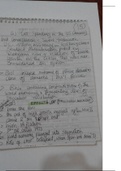Class notes
IRL 2005.Comparative Foreign Policy.Cherotich Notes
- Course
- Institution
- Book
The field of foreign policy of a country consists of self-interest strategies chosen by the state to safeguard its national interests and to achieve goals within its international relations. It is a vibrant and dynamic subfield of international relations. ... It explores key actors engaged in forei...
[Show more]



